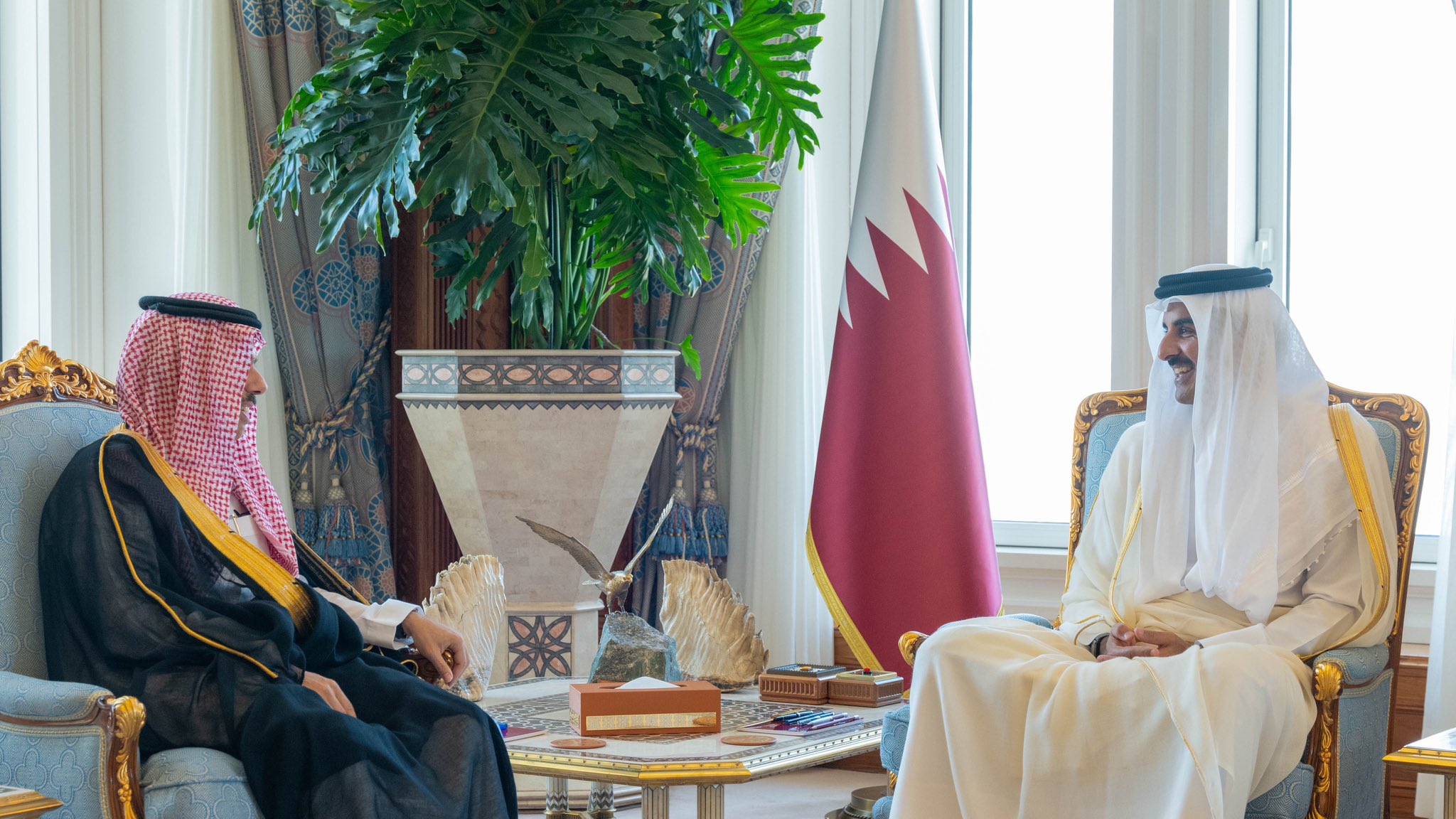Qatar and Saudi Arabia have been engaging in talks over Lebanon’s prolonged power vacuum under a quintet group.
Qatar’s Amir Sheikh Tamim bin Hamad Al Thani met with Saudi Arabia’s Foreign Minister Prince Faisal bin Farhan Al Saud in Doha on Tuesday to discuss relations between the neighbouring Gulf states as well as a range of regional developments.
The official trip was announced by the Amiri Diwan, which stated Prince Faisal conveyed the greetings of Saudi Arabia’s King Salman bin Abdulaziz Al Saud and Crown Prince Mohammed bin Salman to the Qatari leader.
“The Amir entrusted the Saudi Foreign Minister to convey his greetings to the Custodian of the Two Holy Mosques and to HRH the Crown Prince and Prime Minister, wishing them good health and the brotherly Saudi people further development and growth,” the statement read.
The Amiri Diwan added that Sheikh Tamim and the Saudi foreign minister discussed “fraternal relations” as well as “regional and international issues of common concern”, without specifying the exact topics on the meeting’s agenda.
Qatar’s Prime Minister and Minister of Foreign Affairs Sheikh Mohammed bin Abdulrahman Al Thani also attended the meeting at the Amiri Diwan, the statement added.
The meeting on Tuesday follows a remarkable growth in relations between Qatar and Saudi Arabia following the 2017 Gulf Cooperation Council crisis.
At the time of the region’s worst diplomatic rift, Saudi Arabia, the United Arab Emirates, Bahrain and Egypt collectively severed ties with Qatar and imposed an illegal air, land and sea blockade on the country.
The quartet accused Qatar of supporting terrorism, though Doha has consistently and vehemently denied those allegations as “baseless”.
However, the Gulf row came to an end in January 2021 with the signing of the Al-Ula Declaration during a GCC summit in Saudi Arabia, in which the Saudi crown prince rushed to welcome Sheikh Tamim upon his arrival to the kingdom.
Ties between the neighbouring Gulf states have since appeared to return to normal as more mutual visits between leaders and top diplomats continue to take place.
The Qatari-Saudi Follow-up Committee has also met at least 14 times since March 2021 in order to discuss the implementation of the Al-Ula Declaration, the last of which being held on 27 August.
Regional developments
The meeting between Sheikh Tamim and Prince Faisal comes amid major regional developments, including a growing regional engagement with Iran and talks aimed at ending Yemen’s years-long crisis.
In March, former rivals Saudi Arabia and Iran restored ties for the first time in seven years through a historic agreement brokered by China. Riyadh had previously severed ties with Tehran in 2016 after the storming of the Saudi embassy in Iran, following the execution of Shia cleric Nimr Al-Nimr.
Qatar was among a list of countries that welcomed the resumption of ties between the two former regional powerhouses.
The rapprochement between Iran and Saudi Arabia have appeared to spill over into Yemen, where the two parties have stood at loggerheads. In recent weeks, negotiations to end the Yemen conflict have appeared to gain momentum with talks between Saudi and Omani delegations as well as Houthi rebel officials.
Last week, Saudi Arabia welcomed “positive results” from discussions with Yemen’s Houthi rebels in Riyadh.
Since 2015, Yemen has been riddled in a deadly war between the Saudi coalition and the Iran-backed Houthi rebels following the latter’s capture of the capital Sanaa.
While Yemen has experienced a period of relative calm this year, sporadic violence has continued in different parts of the country.
A Houthi rebels’ drone attack along the Saudi-Yemeni border on Monday that killed two Bahraini military personnel has triggered regional outrage and is feared to jeopardise recent peace efforts.
Spokesman for the Saudi-led coalition Brigadier General Turki al-Malki said they had “the right to respond at the appropriate time and place” to the Houthi attack, which he described as a “treacherous hostile act”.
Meanwhile, Qatar and Saudi Arabia have also been engaging in talks on Lebanon’s prolonged power vacuum.
The two countries are members of a quintet group that also includes Egypt, the United States, and France. The five parties have been engaging in talks since February under an initiative led by French Presidential Envoy for Lebanon Jean-Yves Le Drian.
The talks are aimed at filling the vacant Lebanese presidency seat after former President Michel Aoun left office in October last year.







